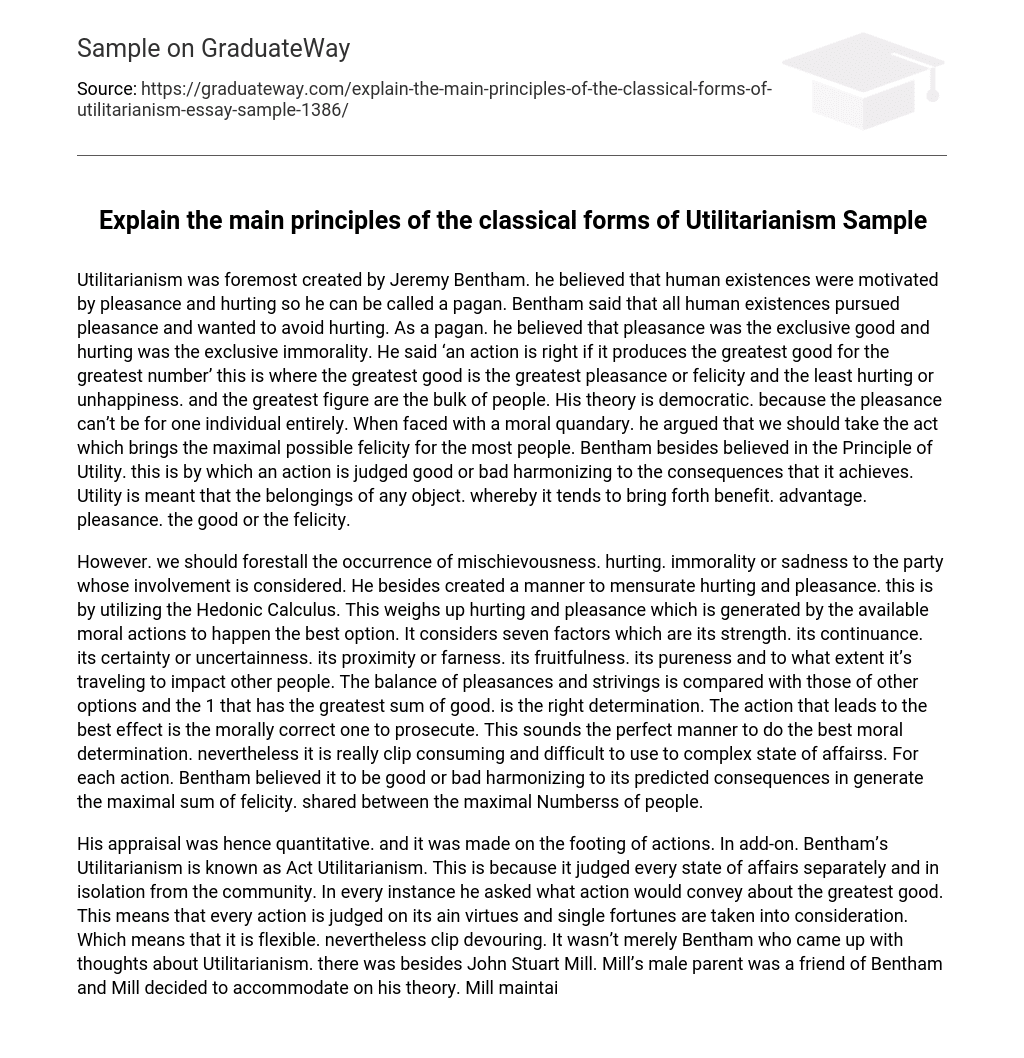Utilitarianism was foremost created by Jeremy Bentham. he believed that human existences were motivated by pleasance and hurting so he can be called a pagan. Bentham said that all human existences pursued pleasance and wanted to avoid hurting. As a pagan. he believed that pleasance was the exclusive good and hurting was the exclusive immorality. He said ‘an action is right if it produces the greatest good for the greatest number’ this is where the greatest good is the greatest pleasance or felicity and the least hurting or unhappiness. and the greatest figure are the bulk of people. His theory is democratic. because the pleasance can’t be for one individual entirely. When faced with a moral quandary. he argued that we should take the act which brings the maximal possible felicity for the most people. Bentham besides believed in the Principle of Utility. this is by which an action is judged good or bad harmonizing to the consequences that it achieves. Utility is meant that the belongings of any object. whereby it tends to bring forth benefit. advantage. pleasance. the good or the felicity.
However. we should forestall the occurrence of mischievousness. hurting. immorality or sadness to the party whose involvement is considered. He besides created a manner to mensurate hurting and pleasance. this is by utilizing the Hedonic Calculus. This weighs up hurting and pleasance which is generated by the available moral actions to happen the best option. It considers seven factors which are its strength. its continuance. its certainty or uncertainness. its proximity or farness. its fruitfulness. its pureness and to what extent it’s traveling to impact other people. The balance of pleasances and strivings is compared with those of other options and the 1 that has the greatest sum of good. is the right determination. The action that leads to the best effect is the morally correct one to prosecute. This sounds the perfect manner to do the best moral determination. nevertheless it is really clip consuming and difficult to use to complex state of affairss. For each action. Bentham believed it to be good or bad harmonizing to its predicted consequences in generate the maximal sum of felicity. shared between the maximal Numberss of people.
His appraisal was hence quantitative. and it was made on the footing of actions. In add-on. Bentham’s Utilitarianism is known as Act Utilitarianism. This is because it judged every state of affairs separately and in isolation from the community. In every instance he asked what action would convey about the greatest good. This means that every action is judged on its ain virtues and single fortunes are taken into consideration. Which means that it is flexible. nevertheless clip devouring. It wasn’t merely Bentham who came up with thoughts about Utilitarianism. there was besides John Stuart Mill. Mill’s male parent was a friend of Bentham and Mill decided to accommodate on his theory. Mill maintained that the wellbeing of the person was of greatest importance and that felicity is most efficaciously gained when persons are free to prosecute their ain terminals. capable to regulations that protect the common good of all. Whilst Mill accepted the public-service corporation rule of the greatest good for the greatest figure. he was concerned.
If the greatest good for the greatest figure was strictly quantitative. based on the qualities of pleasance and hurting caused. what would halt one person’s pleasance from being wholly cut off if the bulk gained pleasance from that act. To turn to this Mill focused on the qualitative pleasances alternatively of quantitative like Bentham. He developed a system of higher and lower pleasances. preferring the higher pleasances to the lower 1s. he went on to state “it is better to be a human dissatisfied than a hog satisfied” . Mill believed that pleasances of the head were higher than those of the organic structure. Higher Pleasures are things such as Art. Drama and Poetry ; the Lower Pleasures were things such as Sexual activity. Food and Drink. He believed that the lower pleasances were carnal like pleasances and he said that we were traveling off from this. Nevertheless. there’s a nexus between the two. as to be able to bask poesy or art. we need to eat and imbibe in order to last. However. Mill clearly believed that to prosecute bodily pleasures e. g.
Food. drink. drugs and sex – wasn’t faced with a pick between pleasances of the organic structure or a pleasance of the head. that of the head is to be preferred. Mill besides went beyond Bentham in suggesting a positive topographic point for regulations within an overall Utilitarian attack. He uses the illustration of a individual who tells a prevarication in order to acquire some immediate advantage. He argues that society needs the rule of truthfulness. without which cipher would of all time be able to swear anybody to be stating the truth. Therefore. the regulation that one should state the truth is a general agency of procuring the greatest felicity for the greatest figure. Interrupting that regulation. although it might look to offer greater felicity in the immediate state of affairs. will in the long tally lead to less felicity. Furthermore. Mill’s Utilitarianism is known as Rule Utilitarianism. This is because he would seek to specify it in a manner that made it practical to utilize when making regulations in society. He concentrated on how determinations are reached so the greatest good is given to the greatest figure in society. Individual pleasance is frequently sacrificed to the community. Mill believed for a society to run it needful general regulations which needed to be accepted. Mill besides believed that Utilitarianism should be Universal. He said that everybody around the universe would be able to populate by the theory.





